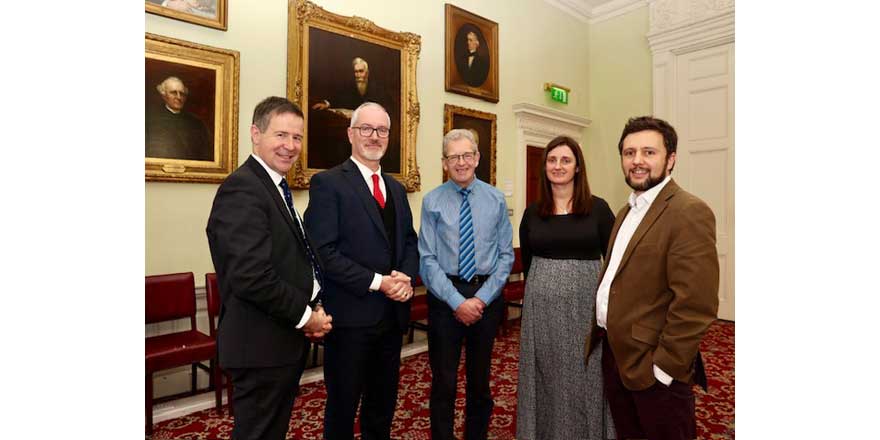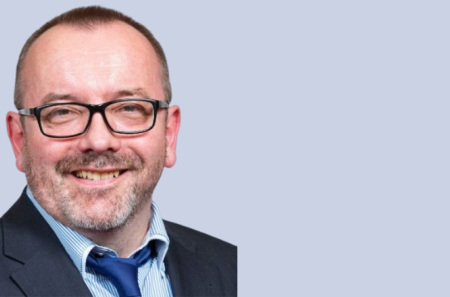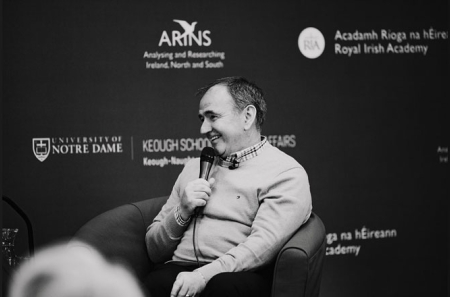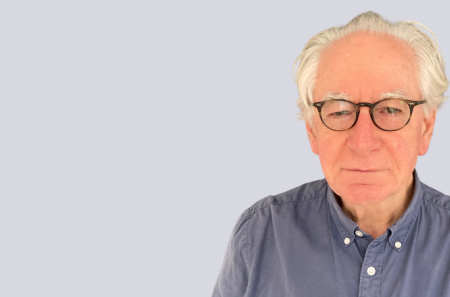
Conversations on Britishness and Irishness
11 December 2023Luke Sheehan
“It’s our history – but we can’t be trapped by it.”
- Wallace Thompson
Conversation 4 of 4.
Organised by: the ARINS Project (of Notre Dame University and Royal Irish Academy) and the George Mitchell Institute of Irish Studies at the Queens University of Belfast
Opened by: Richard English, Senator George J Mitchell Institute for Global Peace, Security and Justice, Queen's University Belfast
Wallace Thompson, Co-founder of the Democratic Unionist Party
with Sam McBride, Journalist at The Belfast Telegraph and The Economist
Friday, 8th December 2023, at the Royal Irish Academy
***
Take a deep breath before considering the layers making up the self-declared identity of the last guest in the current series of ‘Conversations on Britishness and Irishness’ from ARINS/Queens University Belfast. Wallace Thompson, who describes himself on X as an “evangelical Protestant, former civil servant and political adviser” (note the order) is a fascinating politician. A living embodiment of the traditions that led the DUP to be the dominant force in Loyalist politics which it remains to this day, he is also an advocate of openness to change that may surprise audiences in North and the Republic alike.
An immediate takeaway from this discussion was the density of detail. With candour and clarity, in the space of one hour of discussion at the Royal Irish Academy, Mr Thompson dropped lightning-fast answers to questions on himself and on the North and South of Ireland, and the Union. It was a conversation that copper fastened some collective and individual pieties – ‘the importance of dialogue’ for instance – but also revealed plenty of radical takes. “It’s gone belly up and we know that,” he said of one major political event of the past decade that seemed to have left him with a bitter lingering taste for the cack-handed voting process and the Westminster party that oversaw it (the Tories and Brexit of course).
In a two-way discussion introduced by historian and political scientist Richard English (QUB), Wallace Thompson was thoroughly and scrupulously interviewed by Sam McBride, writer at the Belfast Telegraph, the Economist and author of ‘Burned: The Inside Story of the Cash for Ash Scandal’(Irish Academic Books, 2019). Moving back and forth in time, adding precise details of context, Sam McBride’s questions probed into unionist politics with a doggedness that few journalists shaped outside Northern Ireland would be able to muster. So, where does a founding member of the DUP (1971), a loyal carrier of the legacy of Ian Paisley and the Orange tradition, a self-described “staunch” unionist, an evangelical Protestant and Northern Irishman see his own identity now? And what did he wish to say on the state of the Union that he has spent much of his life upholding and transforming, and of the United Kingdom overall?
Opening his questioning, Sam McBride praised Mr Thompson for having “probably annoyed everyone in northern politics in his time.” Being precise and open about beliefs and loyalties was a core theme of the encounter: above all (reflected in Mr English’s introduction of the DUP-founder) piety to Evangelical Protestantism as encountered first in the person of Ian Paisley. The religious divide of the North was present in his childhood.
“I grew up conscious of being a Protestant, and there were Roman Catholics. In the 50s and 60s, it was a background thing.”
Of course, change came, with adolescence coinciding with the late 60s, and “civil unrest” that was an “unexpected trauma. We didn’t see this coming.” As he matured into a politically conscious adult, the response was emotional and defensive. “I was fearful that our beloved Ulster was under attack,” he described. This led to a search for a defender of tradition and community. Sam McBride moved to what one feels must have been the key encounter of Mr Thompson’s apprenticeship. “How did you first come into contact with Ian Paisley? And how did politics and faith become entwined for you?”
Having been aware of Ian Paisley from as early as 1963, when the Big Man protested outside his school, he reconnected as a follower because the founder of the Free Presbyterian Church possessed numerous qualities lacking elsewhere. “He’s expressing our fears, and he’s forthright” and also voiced his own thoughts clearly. The incumbent government seemed floundering. He became a ‘Paisley Man.’
Later, he “became more conscious of Ian Paisley the Christian. I came to a conversion to faith in Christ through my indirect contact with Ian Paisley.”
Underlined by Sam McBride, Wallace Thompson would remain loyal to Paisley throughout the latter’s life, where the peace process and entry into Stormont took the shine off the revered minister and leader for many in the Loyalist community. Mr Thompson entered the Northern Ireland Assembly government as special advisor to Nigel Dodds. The ultimate decision to share power with Sinn Fein in 2007 rings out as an about-turn.
“You wouldn’t, I think,” pressed Mr McBride, “have done that in 1971, as co-founder of the DUP.”
Wallace Thompson: “I wrestled with the concept… it was painful … but I supported what he did.”
Yet pragmatism, followed up Mr McBride, was not what the DUP was known for. After all, Ian Paisley criticised people as compromisers, and he crafted a party of strict adherence to principles. Every moment in history having its own challenges and pressures, the leader moved with the forces rather than against them, restarting the assembly with a quote from Ecclesiastes (3:7-8):
“A time to tear and a time to mend. A time to be quiet and a time to speak. A time to love and a time to hate. A time for war and a time for peace.”
In 2007, emphasized Thompson, “the troubles were largely over.” Sam McBride moved things forward, to the elephant in the room. “Fast forward to 2016. You are no longer a special advisor to the DUP, but you backed Brexit. Do you have regrets?”
The answer was a clear yes. The Brexit campaign and vote comprise “A lesson in how things shouldn’t be done.” His own opinion was formed on an assessment that the EU’s growth and expansion into different areas of life. Dissent came from Mr Thompson’s own mother in law, a Fermanagh resident who was concerned over the border.
Wallace Thompson: “I said, ‘There’s no need to be worried about the border!’ My words came back to haunt me… It was the worst example of a referendum anywhere in the world. It’s gone belly up and we know that.”
Speaking frankly over how the Conservatives under Boris Johnson navigated things, Mr Thompson didn’t keep his powder dry: “Boris Johnson betrayed the DUP.” An extraordinary follow-up from Mr McBride: “You said at the time it made you question the value of the Union. And I found it shocking at the time, from a founding member of the DUP.”
In recent interviews and commentary, Mr Thompson has been open about his openness to a “New Ireland,” i.e. a united Ireland. Even about its “inevitability.” Without Brexit, pressed Mr McBride, “would you even be sitting here talking about it?”
Wallace Thompson: “Probably not, no.”
The betrayal by conservative politicians was actually a longstanding theme in Northern politics. In this case, Boris simply made idle commitments about questions of key import for all sides, thinking he could “get it all reversed tomorrow.” But of course, this turned out to be false. Where does that leave the Union then?
In describing his position on this visceral problem, Mr Thompson combined forthrightness and fealty to certain of his founding ideals – and re-negotiation with others.
Overall, the last decade has “left us in a new place constitutionally – we must rethink the union.” Noting that colleagues and peers of a stricter disposition will repeat endlessly that
“We must stand firm for the union,” many of the same people admit that “the union is broken.” For that to be healed, new ideas are clearly needed.

Next, Thompson and McBride circled through identity, trauma and memory. Quoting Mr Thompson to himself, Sam McBride evoked how “our forefathers at the Somme fought for things which are gone.”
Wallace Thompson: “I’m driven by my faith. My unionism is important. But my Protestantism is more important. Our forefathers [his grand uncle] were fighting for the Empire.” For Thompson, the Empire is unlikely to strike back. Yet his evangelical faith is far from an all-simplifying tool. On matters of change such as Gay marriage, his faith-led response risks being labelled “absurd… But I still hold to ‘Bible truth.’” That being the case, a future politics should preserve “what I hold dear.” Important to underline that, one feels, in the context of such an extraordinary turnaround on the idea of a united Ireland.
Talking through the violence of the Troubles, of killings directed at people with special gifts and blameless workers on the way to a factory, cruelty and excess form part of the resulting collective selfhood. “The siege mentality of Protestantism,” noted Thompson, “is perhaps hard for people to understand.” Looking from South to North, what comes across as triumphalism is actually a fearfulness, inherited from The Siege of Derry and countless intimate catastrophes in Ulster. A positive note enters when he considers his own grandchildren and the likely very different experience they will have of life in Ireland. “We can’t allow it to trap us moving forward… “that generation will not be trapped by violence.”
In the last part of the dialogue, Thompson and McBride covered the exhilarating play of figureheads and symbolism over the epic Northern story, with the latter’s contributions and quotable moments never far away. Despite being now at constant risk of accusations of appeasement, Mr Thompson inherited enough of his mentor’s firebrand potential. “You went on Joe Duffy and said the Pope was the Anti-Christ!” recalled McBride. Another zinger: Big Ian saw himself as an Irish man. Of the great leader, Mr Thompson noted how “he became open to a broader perspective on how Ireland moves forward.”
Further surprises in the close of a fascinating conversation were brought out by audience questions: asked about civic status under monarchy vs. republic, Mr Thompson avowed that he is “not an ardent monarchist” and no longer sees the Tricolour as the flag of the enemy; on language, he argued that Ulster Scots has a valued place in heritage but “oversold as a language,” when it’s not. In fact, he implied, clinging to Ulster Scots might be something of a comfort blanket as the community lose their religion! A final line of thought brought him to name what rights would he like the state to respect, perhaps in a future ‘New Ireland:’ “The freedom to express bible morality in the public square… to speak about the validity of the Orange Tradition.”
Back-and-froth talk on the possibility of a border poll, the underacknowledged “diversity of unionism” and the shadow of the return to violence (which is harder to forget when those that might ignite it are your neighbours), the exchange culminated in a last question and answer:
Sam McBride: “What brought you here today? You’ll get a lot of grief for what you’ve said.… What would you like a southern audience to know about people like you?”
Wallace Thompson: “We’re genuine… we’re not motivated by sectarianism…
We’re motivated by a love for the people of this island.”
And, as for the cruelties, ideological dead ends and moribund symbols of the past: “I encourage everyone to reach out to each other across the board. It’s our history but – we can’t be trapped by it.”
----
Main image: L-R Pauric Dempsey, Professor Richard English, Wallace Thompson, Ruth Hegarty, Sam McBride
Photos by Johnny Bambury
----
The previous three conversations in the series were held as follows:
31 January 2023 at the Great Hall, Queen's University Belfast
Bertie Ahern, former Taoiseach (1997– 2008) and former leader of the Fianna Fáil Party (1994-2008); Arlene Foster former First Minister of Northern Ireland (2016-2017 and 2020-2021) and former Leader of the Democratic Unionist Party (2015-2021)
Chair: William Crawley, BBC
15 May 2023 at the Royal Irish Academy
Ulster Unionist Party leader Doug Beattie, MLA;
Scottish National Party politician Joanna Cherry, MP;
Social Democratic and Labour Party politician Claire Hanna, MP
Chair: Professor Cathy Gormley-Heenan, University Provost at Ulster University
13 June 2023 at the University of Notre Dame, London
Declan Kearney MLA, Sinn Féin National Chairperson
Lord Weir, Democratic Unionist Party Politician
Chair: Dr Mary C. Murphy, Jean Monnet Professor in European Integration, University College Cork.



